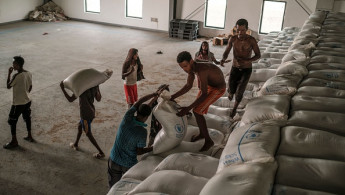WFP says its first aid convoy since Ethiopia peace deal enters Tigray
The World Food Programme (WFP) said its first aid convoy since the signing of a landmark peace deal between Ethiopia's government and Tigrayan rebels had arrived in the war-torn Tigray region on Wednesday.
Restoring aid deliveries to Tigray was a key part of the agreement signed in South Africa on November 2 to silence the guns in a two-year conflict that has killed untold numbers of people and unleashed a humanitarian crisis in northern Ethiopia.
"@WFP trucks are now rolling into #Tigray with critical food assistance-this is the first movement since the peace agreement was signed," the UN agency's chief David Beasley said on Twitter.
CRUCIAL: @WFP trucks are now rolling into #Tigray with critical food assistance—this is the first movement since the peace agreement was signed.
— David Beasley (@WFPChief) November 16, 2022
Progress must continue. All sides must uphold the agreement. Basic services must resume immediately. #Ethiopia needs peace. pic.twitter.com/lbpIC6dOFc
The region of six million people has been suffering from a severe lack of food and medicine, as well as limited access to basic services including electricity, banking and communications, with the UN warning that many people were on the brink of starvation.
"Progress must continue. All sides must uphold the agreement. Basic services must resume immediately," Beasley said.
The WFP announcement followed the arrival on Tuesday of a medical aid convoy from the International Committee of the Red Cross, the first ICRC trucks to arrive in Tigray since the deal between the Ethiopian government and the Tigray People's Liberation Front (TPLF).
A WFP spokeswoman told AFP that 15 trucks had entered the region on Wednesday, with "more (expected) in the coming days".
The UN agency said the convoy had travelled along a route through neighbouring Amhara for the first time since June 2021, when TPLF fighters recaptured Tigray from federal forces and expanded into the bordering regions of Amhara and Afar.
The November 2 deal was followed by an implementation accord reached in the Kenyan capital Nairobi on Saturday, with the two sides committing to facilitate unfettered humanitarian access to "all in need" in Tigray and neighbouring regions with immediate effect.
Aid deliveries were forced to a halt in late August when fighting resumed in northern Ethiopia, shattering a five-month truce and leading to the capture of key towns in Tigray by pro-government forces.
Even before those clashes, Tigray was in the grip of a hunger crisis, with the WFP warning in early August that nearly half of the region's population was "severely food insecure", with some 90 percent of its people requiring food aid.
Ethiopian Prime Minister Abiy Ahmed has vowed to fulfil the commitments made in the peace deal, saying that his government secured 100 percent of what it had sought in the negotiations with the TPLF.
As well as the restoration of aid and a cessation of hostilities, the deal reached in the South African capital Pretoria calls for the disarming of TPLF fighters and the re-establishment of federal authority over Tigray.
But it makes no mention of the presence on Ethiopian soil or any possible withdrawal of Eritrean troops, who have backed Abiy's forces and been accused of atrocities.
A senior State Department official on Tuesday told reporters that the United States would not hesitate to use sanctions "if that should become necessary in terms of holding actors accountable for human rights violations or for the purposes of trying to ensure that this agreement is respected".
The conflict between the TPLF and pro-Abiy forces -- which include regional militias in addition to the Eritrean army -- has forced more than two million people from their homes and driven hundreds of thousands to the brink of famine.
The war erupted in November 2020 when Abiy, a Nobel Peace laureate, sent troops into Tigray, accusing the TPLF of attacking federal army camps.
The TPLF had dominated national politics for nearly three decades until Abiy took office in 2018.





 Follow the Middle East's top stories in English at The New Arab on Google News
Follow the Middle East's top stories in English at The New Arab on Google News


